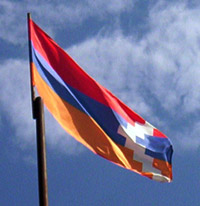The OSCE Minsk Group American co-chairman and assistant to the U.S. Secretary of State Matthew Brayza recently revealed the secret principles of the Karabagh conrflict negotiations. His principles didn’t really differ from the principles of the International Alert Group.
According to deputy head of the Karabagh National Assembly foreign affairs committee Gagik Petrosyan, Matthew Bryza is doing this for a couple of reasons.
“Informing the public about some important factors of the conflict negotiations means that either the intermediaries are trying to find out the public opinion of the three countries concerning the proposed scenarios, or there are serious disagreements on the negotiations between Armenia, Azerbaijan and the intermediary countries. This means that we will either have new approches or principles. I am more for the second reason and substituting the former American co-chairman is proof of this,” said Gagik Petrosyan.
“Those principles are not in our interests. The thing that I accept the most is the return of the territories and defining the status of Karabagh through a referendum. I can’t predict what will happen later. But if we pay attention to what Bryza says, especially his announcement about how non-democratic Armenia is compared to Azerbaijan, I think that there may be a pause in the negotiations,” sai d G. Petrosyan.
“This is the first time that the co-chairman is presenting the conflict principles in a systemized manner, rather than separately,” says head of the Karabagh National Assembly foreign affairs constant committee Vahram Atanesyan. He emphsizes the fact that the principles mentioned by the newly appointed American co-chairman don’t correspond to Karabagh’s official decision. According to Atanesyan, revealing the secrets of the negotiations means that “they are trying to pressure in some way, otherwise the co-chairmen could have reached some agreement by now. Besides that, there can be no agreement without the consent of the Karabagh authorities.”
“Unfortunately, I personally get the impression that Bryza’s announcements are aimed towards the Armenian society because those principles fully correspond to Azerbaijan’s interests. I’m talking about returning the territories of Karabagh that are supposed to be a security zone, while determining the status of Karabagh is being delayed for an uncertain amount of time,” says V. Atanesyan.
Politician David Babayan believes that revealing the secrets of the negotiations means that there seriously are disagreements and obstacles and that those obstacles can’t be overcome. So, revealing everything out in the open in mid-2006, when 2006 has been declared the year for the Karabagh conflict resolution, means that there won’t really be any success.
“The Armenian side simply doesn’t accept the announcments made by Azerbaijan and some international organizations, claiming that the territories will be returned and there will be a referendum to determine the status of Karabagh because the territories are just as important as the status. Karabagh’s status will be kind of formal if it loses some territories. For example, I can state the significance of the Karvatchar region and the fact that 85% of Karabagh’s water resources start there and the Arpa and Vorotan rivers. If that territory isn’t under the control of Karabagh, then Karabagh may find itself in danger of ecological terror. The best thing would be to recognize Karabagh as an independent state, but Azerbaijan isn’t even thinking about that. It claims that Karabagh’s status will be determined after an uncertain time. If everything goes as planned, then the people of Karabgh may suffer serious psychological harm and won’t be able to get out of the situation. It’s absurd for the winning side to take that step. The most interesting thing is that Karabagh’s independence and Azerbaijan providing Karabagh with an autonomous status are dangerous for Azerbaijan because in both cases, the ethnic minorities living in Azerbaijan, including the Talish and Lezgis, will demand the same rights. This may lead to the elimination of Azerbaijan’s statehood,” says the politician.

